| North Shore District Group |
Scholarship Past Recipients2020 |
Val Williams Scholarship in BotanyThe Val Williams Scholarship in Botany is sponsored by the North Shore Group of the Australian Plants Society. The Scholarship honours the memory of our former esteemed member, Val Williams (1937-2004). The project must contribute to the knowledge of the ecology, conservation or propagation of native plants in the Sydney and surrounding regions.Recipient 2024 - Paola Raupp
My passion for understanding natural ecosystems and contributing to their preservation was sparked by biologists featured in documentaries during my childhood in Brazil. Throughout my bachelor’s degree in biology, I estimated the costs associated with direct seeding and tree planting for restoring Brazilian forests and savannas. This was followed by a master’s degree in Ecology and Conservation of Natural Resources, during which I investigated the effects of different levels of herbivory on the survival and regrowth of native shrub and tree seedling species. Currently, my research centres on exploring aboveground and belowground barriers to succeed in restoring the Cumberland Plain Woodlands (CPWs), one of Australia's most threatened ecological communities. For this project, I aim to understand the relationships between soil properties and native and exotic plant communities across varying degradation conditions within CPW ecosystems. My research addresses key gaps in understanding soil health by analysing soil biota and physicochemical factors and their influence on vegetation composition and abundance in sites ranging from more intact to highly degraded. This can enable the identification of soil constraints to assist land managers and bush regenerators in achieving successful restoration outcomes in degraded landscapes, thereby enhancing native plant diversity and the integrity and resilience of the ecosystem. The Val Williams Scholarship award will support me in carrying out biological soil analysis, including phospholipid fatty acid (PLFA) and DNA sequencing techniques to understand microbial community abundance and composition. These analyses can offer insights into microbial legacies, influenced by factors such as past land use and environmental disturbances, and their effects on native plant diversity. This support will maximise the impact of my research and advance the knowledge of ecology and conservation within the Cumberland Plain.Recipient 2023 - Sashini Perera
Sashini's proposed research builds on an existing field experiment at the Australian Botanic Garden Mount Annan wherein 10 species were chosen that have widespread native distributions across the New South Wales region. For each species, two very different provenances were selected. The contrasting climates are local Western Sydney climate and a hotter, drier climate. The research proposes to investigate the influence of climate provenance on survival and plant performance with a view to predicting the success of species if Western Sydney becomes hotter and drier. The second aspect of the project investigates the effect of addition of bio-char (charcoal) to the soil with and without microbial inoculation, under drought conditions. The funds from the scholarship will enable the addition of a complementary glasshouse experiment, enable foliar nutrient analyses for both the field and glasshouse experiments and soil nutrient analysis of the field experiment. These will enable better assessment of the efficacy of the soil amendments for plant performance.Recipient 2022 - Sarah McInnes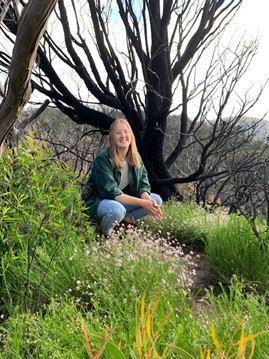 In 2022 there were four applicants from three different universities, a mix of PhD and Masters students. The scholarship, valued at $3,500, was won by Sarah McInnes who is a PhD student at UNSW. She is researching how dormancy is controlled in seeds of heat-responsive Australian fire-prone species. In 2022 there were four applicants from three different universities, a mix of PhD and Masters students. The scholarship, valued at $3,500, was won by Sarah McInnes who is a PhD student at UNSW. She is researching how dormancy is controlled in seeds of heat-responsive Australian fire-prone species."Growing up only a couple of minutes from both Ku-ring-gai Chase and Garigal National Park, my love for plants was fostered at a very early age. While I may have started my science journey in chemistry, witnessing the 2019-2020 bushfires was a pivotal moment for me. It was the final push that led me into an Ecology Honours, and now a PhD in Ecology at the University of New South Wales, where the persistence of plants, and how we can conserve them, became my focus. “It’s well known that plants germinate in response to fire, as different fire cues break dormancy. For physically dormant seeds – that is, seeds with a water impermeable seed coat – heat from fire is often the cue that breaks dormancy. Seeds can have their dormancy broken at temperatures ranging from 40 °C to 120 °C. These variations in temperatures are important, as they determine what seeds will germinate in response to different fires. However, why these dormancy breaking temperatures vary is unknown and, with the support of the Val Williams Scholarship, this is something I aim to address. “It’s been hypothesised that the oils (specifically, fatty acids) in the seed coat could be controlling these dormancy breaking temperatures. To test this, I will extract the fatty acids from 21 plants native to Sydney and wider NSW. I will then compare these fatty acid profiles with the temperature at which each species breaks dormancy. By understanding why the temperature required to break dormancy varies, we can better understand how plant communities will respond to different fires. Given fire regimes are altering under climate change, this is particularly important.” Recipient 2021 - Harriet Simpson-Southward
“I am a PhD Candidate working in the Centre for Environmental Risk Management of Bushfires (CERMB) at the University of Wollongong. I have always been interested in conservation from a young age, however my passion for fire ecology only began when I spent a year on exchange in Australia during my undergraduate degree. I went on to complete my Honours project in the CERMB and was delighted to be given the opportunity to return to Australia to undertake further research in this field. Witnessing the devastation caused by the recent 2019-2020 bushfire season has only emphasised the importance of such research to me. The mortality of eucalypts and therefore their distribution patterns can be influenced by a range of different environmental and landscape parameters. Firstly, I am investigating whether certain combinations of bark traits, climatic parameters, fire regimes and topographic positions increase the likelihood of mortality in some eucalypt species. Secondly, I am investigating whether this makes some species more vulnerable to range shifts under climate change. The findings will contribute to improving public awareness, government decision-making and management policies. Knowledge of the spatial distribution of eucalypt bark traits will enable better prediction of eucalypt responses to increases in fire frequency and severity with climate change. I aim to use the Val Williams Scholarship to gather important data about the influence of topographic variation on bark traits, substantially expanding on my existing PhD research and delivering a broader evidence base for the impacts of fire and climate change on eucalypt species in Australia. Ultimately, I hope to use it to determine the influence that elevation, slope and aspect may have on bark thickness and density.” Recipient 2020 - Shubham Chhajed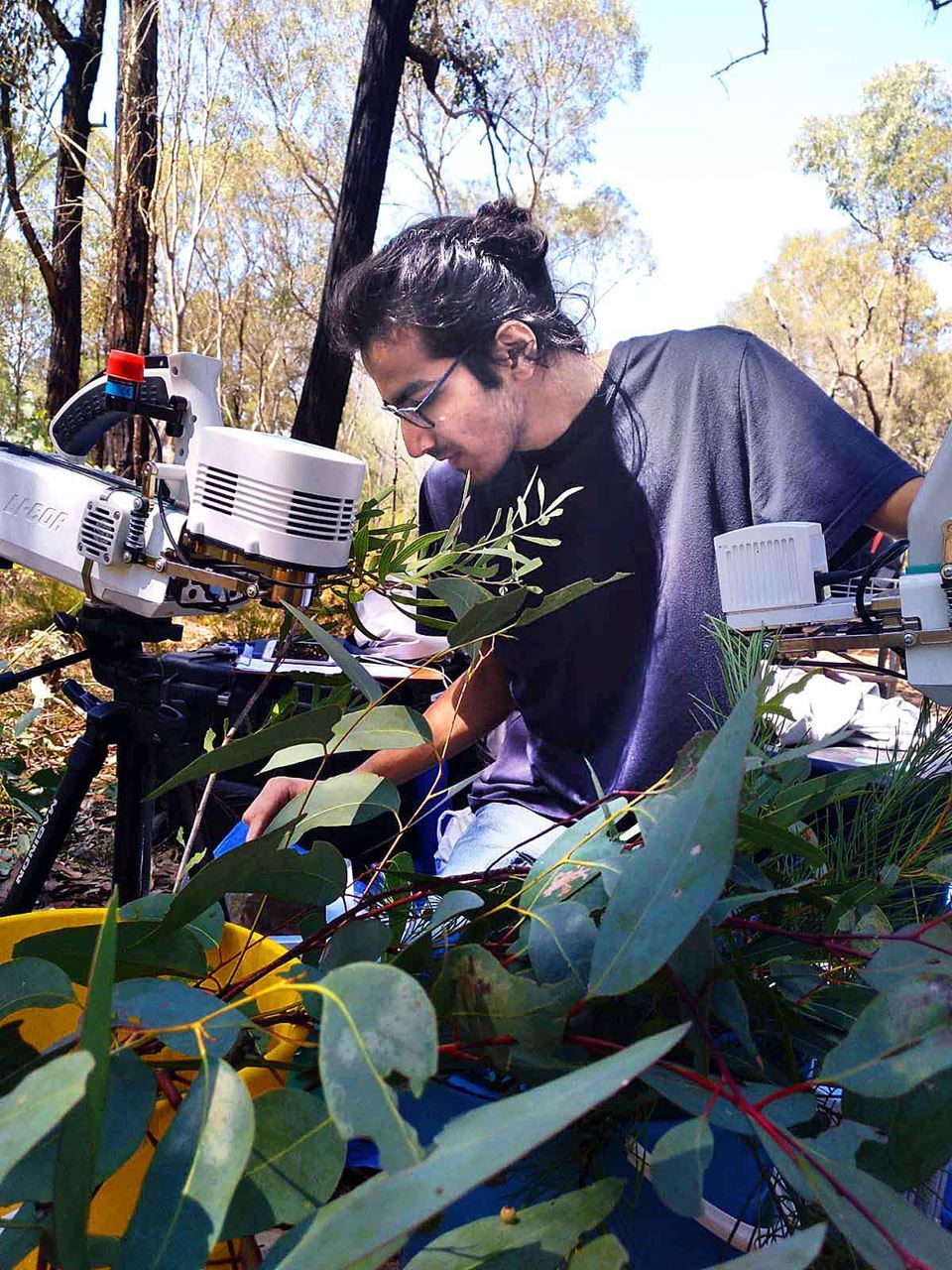 This year there was a record number of applicants, eight in all, coming from four different universities. The scholarship was awarded to Shubham Chhajed, a PhD candidate from the Department of Biological Sciences, Macquarie University. His research focusses on the hydraulic drivers of photosynthetic variation in co-occurring plant species in Sydney region using a least-cost theory approach. Here he describes his interests and motivation: "Growing up as a farmer’s son naturally made me curious about plants. I was amazed that all plants use the same resources (water, light, nutrients etc.) to carry out photosynthesis and yet, there is a stupendous amount of variation in their photosynthetic output. This childhood curiosity of mine turned into a scientific passion and has been the primary focus of my previous and current research work. "During my undergraduate research at Indian Institute of Science Education and Research (IISER), Pune, I studied plant responses to water, nutrients, and temperature stresses and the underlying eco-physiological mechanisms. For my PhD at Macquarie University, I decided to focus on the investments that plants make to acquire and use these resources. Investments towards these multiple resources are interchangeable and plants balance them to achieve the optimal level of photosynthesis while incurring the least total cost. I seek to understand how plants manage to achieve this balance and what traits assist in the optimization. Preliminary results show that hydraulic traits such as rooting depth and water storage ability of plants are closely related to photosynthetic output at a short time scale. The Val Williams Scholarship would enable me to test these hydraulic trait – photosynthetic trait relationships at a longer time scale via a foliar δ13C analysis. δ13C is a stable carbon isotope signature that represents the ratio of 13Carbon to 12Carbon in leaves. It will significantly expand the scope of my current study and facilitate understanding long-term effects of plant hydraulic properties. I am excited to see what the isotope analysis reveals about water management strategies in plants at an extended time scale." Recipient 2019 - Farhad Masoomi-Aladizgeh
His topic is ‘DNA: the key to understanding evolutionary relationships between Australian ecotypes of Themeda triandra (kangaroo grass)’. Farhad describes his project for us: "My PhD at Macquarie University is mainly on identifying stress tolerance genes in plants from distantly related crop relatives. It is well known that native plants are valuable genetic resources, harbouring resistance genes to environmental fluctuations. Climate change is going to adversely impact agricultural products in the near future; thus, steps should be taken by researchers to tackle the problem! "I am already working on cotton proteomics to discover genes related to male sterility after exposure to high temperatures. Under the supervision of Professor Brian Atwell, we aim to find key pathways involved in plant male sterility under heat stress and introduce the key genes that can be applied for crop improvement at high temperatures. "The Val Williams Scholarship has led us to start a new project on a stress tolerant species in Australia, Themeda triandra (kangaroo grass). A diverse collection of its ecotypes provides high genetic diversity with which to find ‘molecular signatures’ for environmental traits. DArTSeq™ protocol, a high-throughput sequencing approach, will be performed using DArT (Diversity Arrays Technology) markers for gene mapping and diversity studies of kangaroo grass ecotypes where there is no previous sequence information. "Having the same genetic codes: adenine (A), guanine (G), cytosine (C), and thymine (T), plants respond to the changing environment too!" Recipients 2018 - Susan Everingham and John WhaleThe Scholarship valued at $3,000 this year, attracted eight applicants, a mix of Honours and PhD students, from six local universities. It is shared between two recipients, Susan Everingham and John Whale, with each recipient receiving $1,500.
In Susan’s words: “Growing up, both my mother and grandmother loved Australian native flora and would take me on bush walks around Sydney, naming all the species. This joy and fascination led me to study plant science at university and I have now just started the second year of my PhD. I am undertaking my research at both The University of New South Wales, and The Australian Botanic Garden, Mount Annan. I really enjoy studying broad scale concepts in ecology as well as applying them to important areas of conservation at local scales. "My PhD encompasses both broad, global scale and smaller scale studies, to try and determine if plants are adapting to climate change that is already occurring. Researchers have made many predictions about how plants will cope in the future, as the climate continues to change. However, we need to know if plants are already changing and adapting to recent climate change, in order for them to survive in the future. "The Val Williams Scholarship from the Australian Plants Society, North Shore Group, will allow me to undertake important fieldwork in the Sydney region, to determine if Sydney plants are flowering earlier in the year than they did in the past, due to climatic warming. I am using a large dataset that was compiled in 1963 that recorded the flowering time of 362 species in Sydney. This year, am doing a huge resampling effort of a subset of this data, to see if flowering times have change since the 1960s. The Val Williams scholarship will be helping me to travel to my sites, tag species and continue monitoring their flowering times.”
“My background has been research of genetic diversity within and between populations of a species and subsequently, how well adapted populations are to the environments they inhabit. In order for me to conduct my research and projects I will use my laboratory experience in DNA extraction and sequencing and analytical skills to look at the diversity and variation between individuals and populations. They will help to answer the questions about the genetic diversity and adaptive potential native Red Gums found in the Sydney Basin have to a changing climate. Among the species I will work with are Eucalyptus tereticornis, a coastal species and E. blakelyi, from the Western Slopes and Tablelands.” Recipient 2017 - Aaron Phillips
His topic was “Surveying evolutionary drift in heat tolerance genes from Themeda triandra (Kangaroo Grass) relative to local Sydney populations”. "I am currently enrolled in the second year of a two-year Master of Research degree within the department of Biological Sciences at Macquarie University. As a child I remember being fascinated by plants - I can still recall the very first time I was told about that wonderful thing called photosynthesis during primary school, when my teacher told us that plants breathe in as we breathe out, and use our exhalations to make food. The plants around me were brought to life after I knew that there was some connection between us. And who could forget their very first "grow a bean in a jar" experiment? Watching the plants grow from the seed brought me so much joy. Despite this, I always wanted to get into veterinary science - a dream that died abruptly after I took my first proper lesson in plant biology under my now supervisor, Professor Brian Atwell, who also gave me a deep appreciation for agricultural species. Nowadays I still find myself obsessed with how plants take CO2 out of the air and turn it into the vast array of chemical compounds that keep humanity on its feet. So, when offered the chance to study a key enzyme in the photosynthetic carbon-fixing reactions, there's no way I could pass that up. My thesis is focussed on the enzyme known as Rubisco activase (RCA). It keeps Rubisco (the enzyme responsible for making useful sugars out of atmospheric CO2) in a functional state, and so helps plants make food. However, when a plant gets too hot, say during a heat wave, RCA can no longer do its job and the plant stops making food. This is not true of Australian wild rice species from hot places. My job, therefore, is to try to identify variants of RCA from other plant species adapted to different climates within Australia that may help the plant to tolerate adverse conditions, like high temperature. Initially, the project was targeting only wild and domesticated species of cotton and tobacco from around Australia, however the Val Williams award has allowed us to extend our analysis into Kangaroo Grass (Themeda triandra), the most widely distributed species in Australia. We want to know whether RCA differs between different populations of Roo Grass, as this would prove to be a powerful demonstration of selection acting on the thermal stability of RCA within a single species across habitats. Recipient 2016 - Johanna Wong
Her topic was “Developing metabolic ‘biomarkers’ for the early diagnosis of Armillaria root rot in eucalypts of the endangered Cumberland Plain Woodland”. “I am from Hong Kong but I love the nature here in Australia as much as the members of the Australian plants society do! Having grown up in the concrete, vertical city, it makes me realize the scarcity of natural scenery and the importance of natural conservation. I cherish my chance to learn about the nature and plants surrounding us. I started my PhD study this year and I am glad to focus my study on eucalypts, the dominant trees in Australian landscape. The main goal of my PhD study is to understand about how eucalypts interact with fungi of different lifestyles. Armillaria is one of the indigenous fungal pathogens which cause root rot of eucalypts. The scholarship allows me to explore possibility to improve detection strategies for Armillaria root rot. Plants secret chemical signals called metabolites to the environment under different stressors. I will identify the metabolite which is only secreted specifically by trees under Armillaria infection. The metabolite can potentially be used as ‘biomarker’ to assist detection of Armillaria disease at early stages. The developed methodology can be beneficial for management of vital ecosystems such as the Cumberland Plain Woodland both around Sydney and throughout Australia to save endangered habitats and vulnerable eucalypts species. The scholarship grant of $2,000 was used to help pay for laboratory consumables and for LC-MS profiling of metabolites collected from root tip samples. Recipient 2015 - Jonathon Pankhurst
His scholarship topic was “The Identification, Impact and Utilisation of native Arbuscular Mycorrhizal Fungi Assemblages by native and exotic plants in Coastal Fore-dunes.” Jon Pankhurst is pictured collecting root samples on coastal dunes of the Illawarra coast. “I am currently undertaking my Honours research at the age of 21. As a child growing up in a rural city I have always enjoyed going on hikes and exploring nature and this has fostered a deep passion for the natural sciences. In 2012 I moved to the Illawarra to commence a degree in Biology at the University of Wollongong. I immediately fell in love with the beach and the relaxed coastal lifestyle. In my free time I enjoy spending as much time as possible at the beach and surrounding areas. Throughout my degree I have developed a strong interest in both genetics and ecology and have heavily studied both fields during my undergraduate years. For my Honours research I have combined my love for the coast with my passion for biology, to explore the relationship between coastal plants and various species of root fungi collectively known as Mycorrhizal fungi. These fungi are essential for providing nutrients to plants, especially those growing in low nutrient soils. Using genetics, we are hoping to identify what species of fungi Bitou bush (a highly invasive coastal weed) is using and how its invasion influences native plant relationships with these fungi. The identity of Australian mycorrhizal fungi has rarely been explored before and determining what species are forming interactions could potentially lead to new control methods of invasive plants. The Val Williams Scholarship allows us to sample a greater area of the Illawarra coastline, giving us a broader and more detailed picture of these interactions. This extra funding will enable us to take up to 3 times as many samples, greatly increasing the accuracy of species identification while giving us a more accurate idea of these fungal interactions with Bitou bush and how its invasion influences native plants in a coastal ecosystem.” Recipient 2014 - Desi Quintans
Desi is pictured with a Morton Bay Fig (Ficus macrophylla). “I am 26 years old and doing a year-long Honours research project. Although I majored in Microbiology, doing DNA- and RNA-related work with plants and insects has always been a lot more enjoyable for me. I was a pastry chef before I was a science student, so you can imagine how exciting it is for me to be spending my working hours outdoors, enjoying the scenery this country has to offer, seeing the sun for a change. I'm really interested in the diversity of forms that plants exhibit, and how wonderful it is that plants look the way they do, and what sorts of adaptations went into that. My Honours project is happily related to this area of interest: We are comparing three Eastern Australian populations of Moreton Bay figs (in South-eastern Queensland, the Sydney Basin, and Lord Howe Island) at a genotypic level to figure out how similar they are, how different, how related. No one else has studied the population genetics of this native Australian fig species before. Of course we also have to wonder how human cultivation of plants changes things, and the Valette Williams Scholarship has allowed us to expand the project to include not only natural-growing Moreton Bay figs but also human-planted ones. Many Moreton Bay figs were planted in Sydney and New South Wales during the 1800s, so I am particularly interested in seeing what has happened to the Sydney Basin population's gene pool after being flooded with trees of uncertain origin.” Recipient 2013 - Jessica Mowle
“I am a 22 year old and I started my PhD candidature in March this year. I have always been local to the Hawkesbury area. Although my formal training is based in Microbiology and Molecular Biology I love plants! This probably started when I was younger as my childhood home backed onto a national park. The other key aspect of my PhD project (aside from the work I will be completing as part of the Val Williams Scholarship) is an experimental translocation of Wollemi pine. In collaboration with Heidi Zimmer from University of Melbourne and the Botanic Gardens Trust 200 Wollemi pine were planted out last August adjacent to the Blue Mountains Botanic Garden, Mt Tomah. I am studying how the microorganisms associated with these Wollemi pine shift as the trees establish themselves in this new environment. The overall aim of this experiment is to identify how soil properties (associated with fertility, pH, water retention, micro-organisms), climate characteristics (temperature, rainfall) and canopy conditions (light penetration) affect fitness of translocated Wollemi pine.” Recipients 2012 - Diane Warman and Berin MackenzieThe scholarship was shared between two recipients, Diane Warman, a BSc. Hons student at Newcastle University ($1,000) and Berin Mackenzie, a PhD student at the University of NSW ($1,000).
The reasons the award committee favoured Diane were the encouragement of the student to continue in a biological science career, that she had relevant experience and she was offering a self-contained and achievable project in 2012. Her research concerns a threatened species in the Sydney area which she had already underway.
He had excellent experience with published papers and he offered a self-contained and achievable project within his PhD program. He came from a professional involvement in ecology with distinguished supervisors and had assistance from other institutions as well. The species B. serrulata and B. ledifolia of interest are icons of the Sydney flora and his research has practical implications to implementation of fire management regimes and to commercial propagation of Boronia species. Recipients 2011 - Nathan Emery and Tanya BangelOur Selection Committee unanimously recommended that the $3,000 available to be shared equally between Nathan Emery and Tanya Bangel.
His Honours and PhD project formed part of the long-standing and continuing collaboration on flannel flowers by botanists at the University of Sydney and the Australian Botanic Garden, Mt Annan. The project entailed seeds being collected from 23 regions, including 6 from the Sydney basin, being bred in large, statistically significant numbers, then compared for growth success and habit. The research contributes to the general knowledge of the ecology, conservation and propagation of this popular native plant with possible significant horticultural commercial prospects.
Micromyrtus minutiflora (no common name) is a smaller version of the really widespread (NSW, Vic, SA) Micromyrtus ciliata (Fringed Heath-myrtle) but, unlike the latter, occurs only in a few places on the Cumberland Plain. For this reason it is rare and endangered. The project included detailed mapping of the exact distribution of the species, and then conducting chemical analyses of plants and soil from particular sites as a start to an understanding of the overall ecology; for example, whether particular soils have physical or chemical properties that are responsible for the rarity, or if the plant has very specific trace element requirements, etc. This research on a local Sydney species has conservation significance because so little is known about it. Recipient 2010 - Alison Hewitt
The scholarship grant of $3,000 (increased from the inaugural $2,000) provided funds for the whole project. Work entailed extraction of DNA and its analysis for the population genetics study. The basic methodology was developed by research at the Royal Botanic Gardens Sydney and the project entailed collaboration with RBGS. Recipient 2009 - Liza Xian
Her thesis work concerned the restoration of the native grasses of a local area, with a project entitled ‘Response of native and exotic grasses of Cumberland Plain Woodland to a nitrogen gradient’. The scholarship grant of $2,000 funded the necessary soil testing, along with a similar grant from the University. |

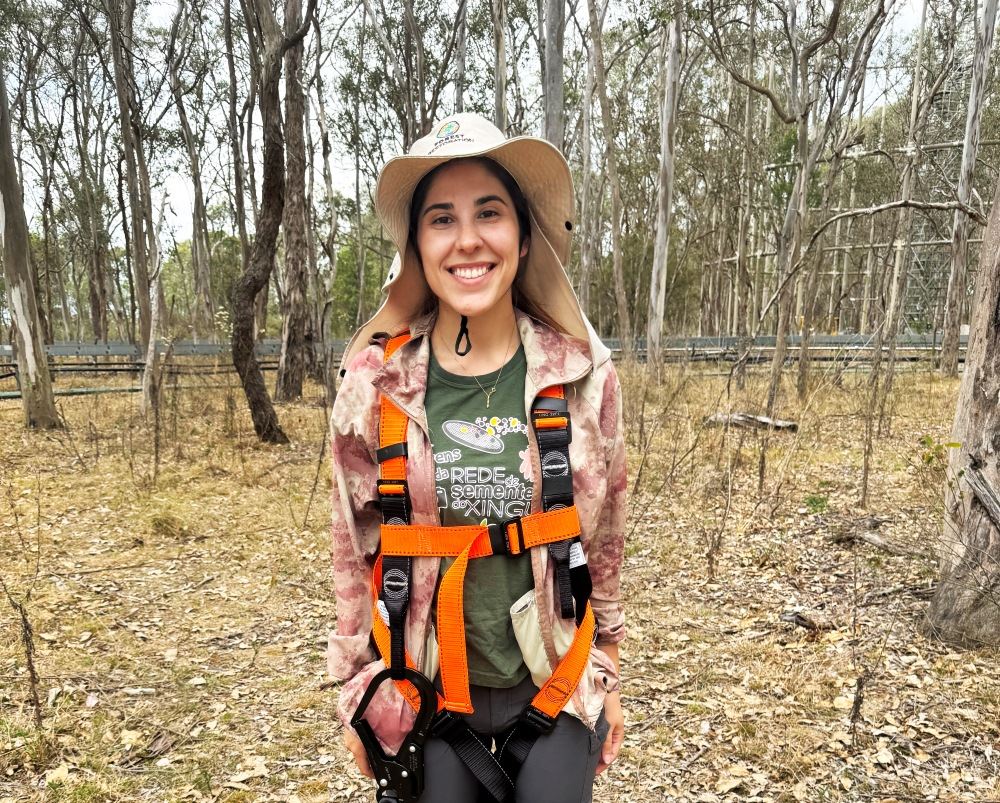 I
am a second-year PhD candidate working in a collaborative research
program at the Hawkesbury Institute for the Environment at Western
Sydney University, focused on supporting the conservation of the
Cumberland Plain.
I
am a second-year PhD candidate working in a collaborative research
program at the Hawkesbury Institute for the Environment at Western
Sydney University, focused on supporting the conservation of the
Cumberland Plain.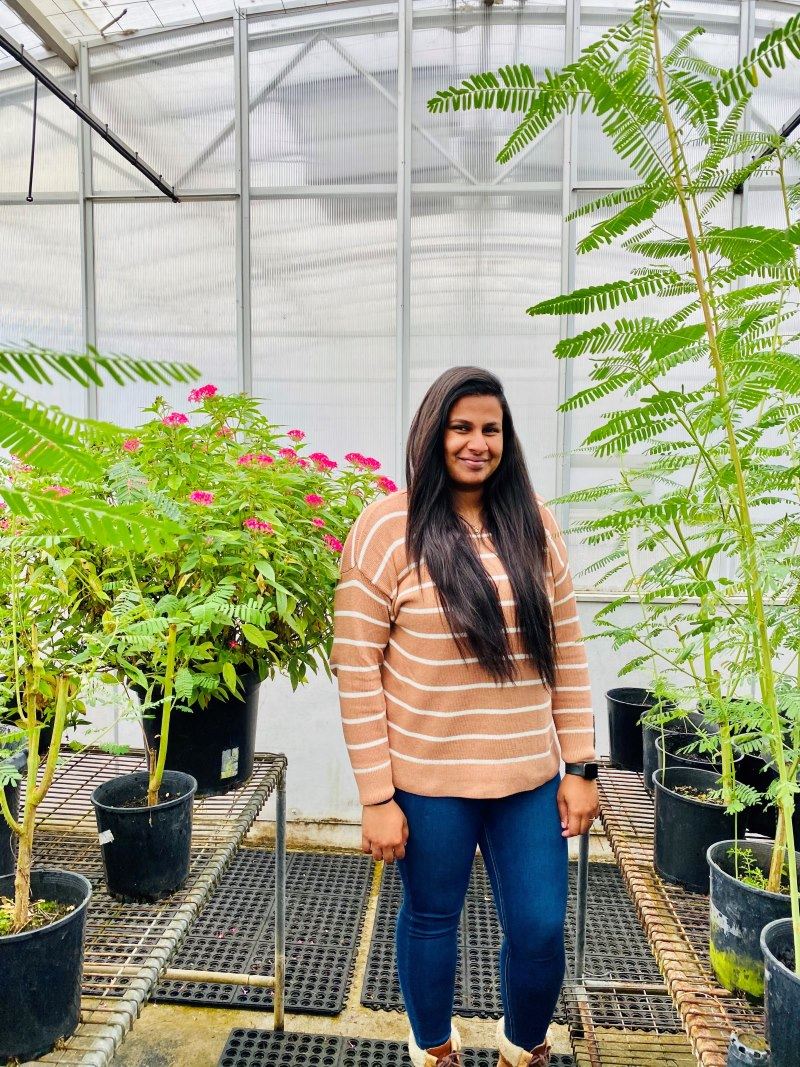 In 2023, the Val Williams Scholarship was awarded to a PhD student from Macquarie University called Sashini Perera.
In 2023, the Val Williams Scholarship was awarded to a PhD student from Macquarie University called Sashini Perera.
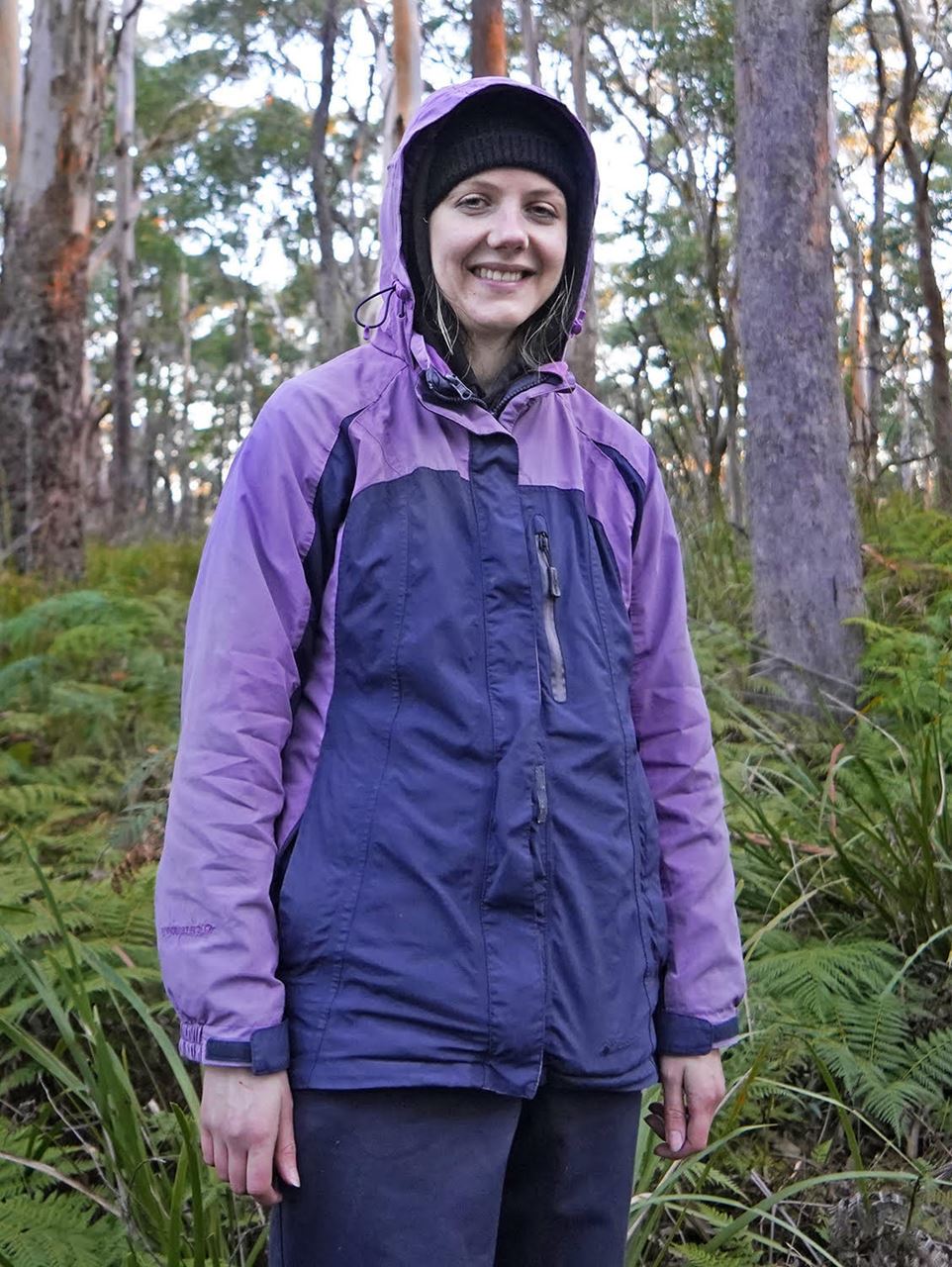 There were three applicants for the scholarship from three different universities, a mix of Masters and PhD students. The chosen recipient was Harriet Simpson-Southward, a PhD candidate in Biological Sciences at the University of Wollongong (UOW).
There were three applicants for the scholarship from three different universities, a mix of Masters and PhD students. The chosen recipient was Harriet Simpson-Southward, a PhD candidate in Biological Sciences at the University of Wollongong (UOW).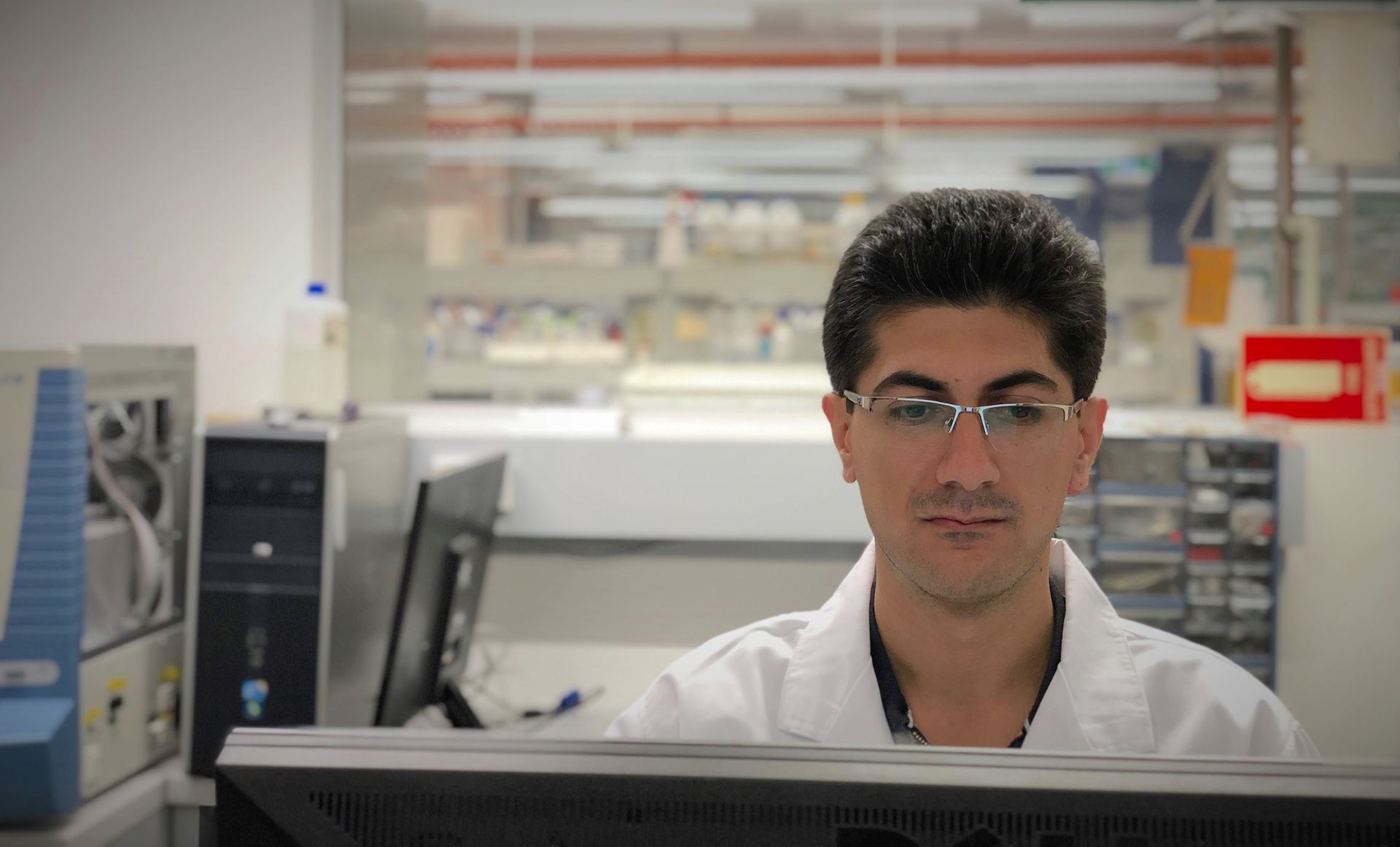 There were six applicants this year, two each from three universities. The recipient of the $3,000 scholarship was Farhad Masoomi-Aladizgeh who is a Doctor of Philosophy in Biology student within the Department of Biological Sciences at Macquarie University.
There were six applicants this year, two each from three universities. The recipient of the $3,000 scholarship was Farhad Masoomi-Aladizgeh who is a Doctor of Philosophy in Biology student within the Department of Biological Sciences at Macquarie University.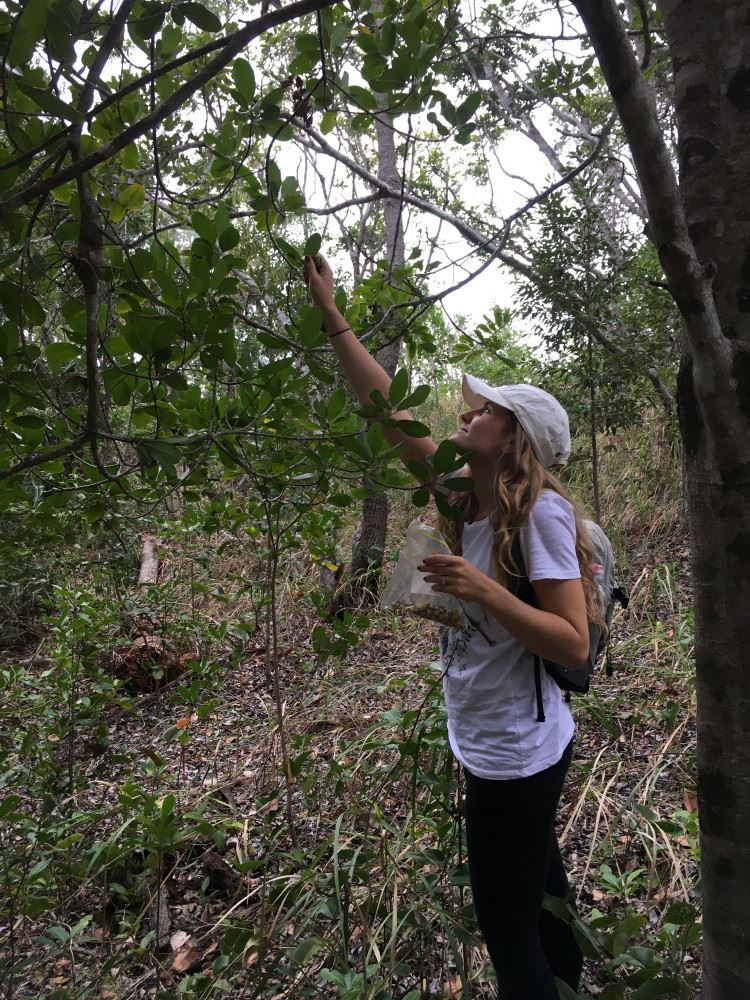 Susan is a PhD candidate within the School of Biological, Earth & Environmental Sciences at University of NSW. Her topic was ‘Are the Sydney plants flowering earlier in the year currently, than they did in the past?
Susan is a PhD candidate within the School of Biological, Earth & Environmental Sciences at University of NSW. Her topic was ‘Are the Sydney plants flowering earlier in the year currently, than they did in the past?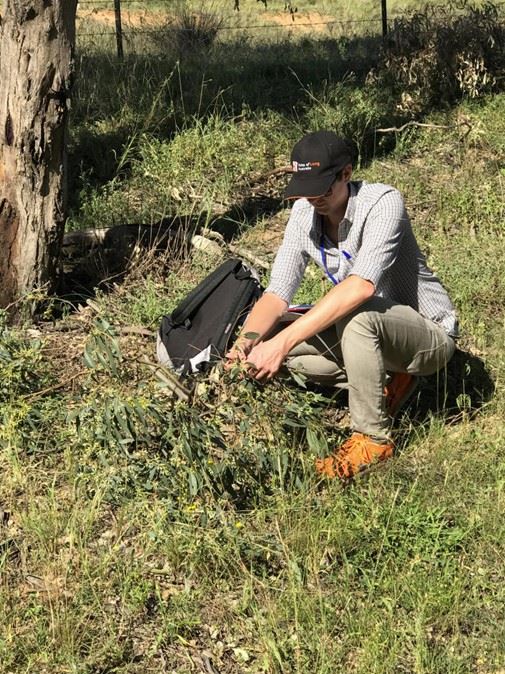 The 2018 co-winner John Whale is a PhD candidate within the Hawkesbury Institute for the Environment at Western Sydney University. His topic is ‘The Scientific Basis of Assisted Gene Migration under Climate Change'.
The 2018 co-winner John Whale is a PhD candidate within the Hawkesbury Institute for the Environment at Western Sydney University. His topic is ‘The Scientific Basis of Assisted Gene Migration under Climate Change'.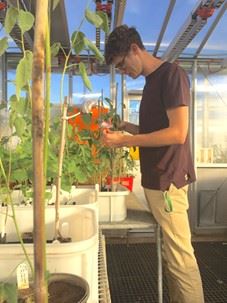 The Scholarship, valued at $2,500 attracted five applicants, a mix of Masters and PhD students, from two universities. The recipient, Aaron Phillips, was a Master of Research student within the Department of Biological Sciences at Macquarie University.
The Scholarship, valued at $2,500 attracted five applicants, a mix of Masters and PhD students, from two universities. The recipient, Aaron Phillips, was a Master of Research student within the Department of Biological Sciences at Macquarie University.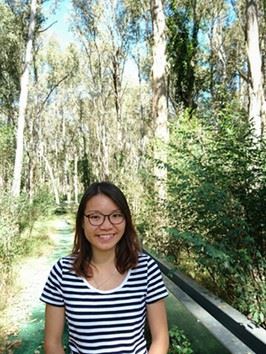 The Scholarship, valued at $2,000, attracted four applicants, a mix of Masters and PhD students, from two universities. The recipient of the scholarship, Johanna Wong, was a PhD student at the Hawkesbury Institute for the Environment at the Hawkesbury Campus of Western Sydney University.
The Scholarship, valued at $2,000, attracted four applicants, a mix of Masters and PhD students, from two universities. The recipient of the scholarship, Johanna Wong, was a PhD student at the Hawkesbury Institute for the Environment at the Hawkesbury Campus of Western Sydney University.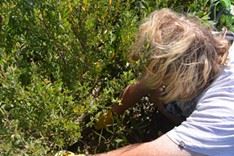 The Scholarship, valued at $2,000, attracted five applicants, a mix of honours and PhD students, from three universities. It was awarded to Jonathon Pankhurst who was studying for BSc Advanced Science (Biology) honours at the University of Wollongong. His supervisors were Professor Kristine French and Prof. Mark Dowton, School of Biological Sciences, University of Wollongong.
The Scholarship, valued at $2,000, attracted five applicants, a mix of honours and PhD students, from three universities. It was awarded to Jonathon Pankhurst who was studying for BSc Advanced Science (Biology) honours at the University of Wollongong. His supervisors were Professor Kristine French and Prof. Mark Dowton, School of Biological Sciences, University of Wollongong.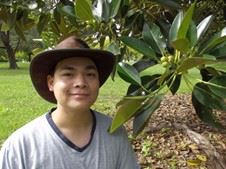 The Scholarship, valued at $2,000, attracted three applicants, a mix of honours and PhD students, from two universities. The winner, Desi Quintans at the University of Western Sydney, chose the topic ‘Genetic contamination of the Moreton Bay Fig: does extensive planting threaten to swamp native populations?’
The Scholarship, valued at $2,000, attracted three applicants, a mix of honours and PhD students, from two universities. The winner, Desi Quintans at the University of Western Sydney, chose the topic ‘Genetic contamination of the Moreton Bay Fig: does extensive planting threaten to swamp native populations?’ 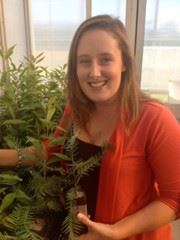 The recipient this year was Jessica Mowle at the University of Western Sydney, Hawkesbury Institute for the Environment. Her scholarship topic was ‘Promoting conservation and future regeneration of Wollemi Pine through manipulation of microbial communities’.
The recipient this year was Jessica Mowle at the University of Western Sydney, Hawkesbury Institute for the Environment. Her scholarship topic was ‘Promoting conservation and future regeneration of Wollemi Pine through manipulation of microbial communities’.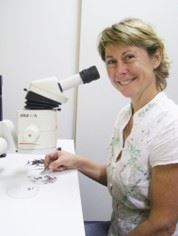 Diane’s topic was ‘What factors influence the habitat, distribution and population structure of Grevillea shiressii Blakely (Proteaceae) a threatened species of the Central Coast of New South Wales’.
Diane’s topic was ‘What factors influence the habitat, distribution and population structure of Grevillea shiressii Blakely (Proteaceae) a threatened species of the Central Coast of New South Wales’.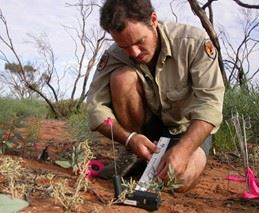 Berin was interested in ‘Assessing dormancy mechanisms and the interaction of seasonal and fire cues for germination of Boronia (Rutaceae)’.
Berin was interested in ‘Assessing dormancy mechanisms and the interaction of seasonal and fire cues for germination of Boronia (Rutaceae)’.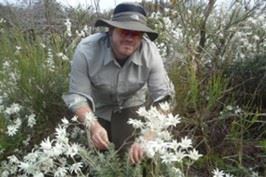 Nathan was a PhD student (first year) at the University of Sydney and his topic was ‘Whether the growth habit of Actinotus helianthi (flannel flowers) from various areas is a function of local genetics and/or its environs’.
Nathan was a PhD student (first year) at the University of Sydney and his topic was ‘Whether the growth habit of Actinotus helianthi (flannel flowers) from various areas is a function of local genetics and/or its environs’.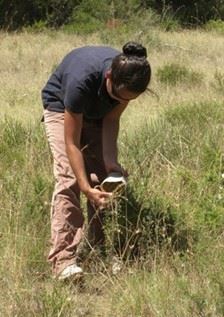 2011 co-winner Tanya Bangel was a BSc Honours student at the University of Western Sydney whose topic was ‘Why the distribution of Micromyrtus minutiflora is so restricted’.
2011 co-winner Tanya Bangel was a BSc Honours student at the University of Western Sydney whose topic was ‘Why the distribution of Micromyrtus minutiflora is so restricted’.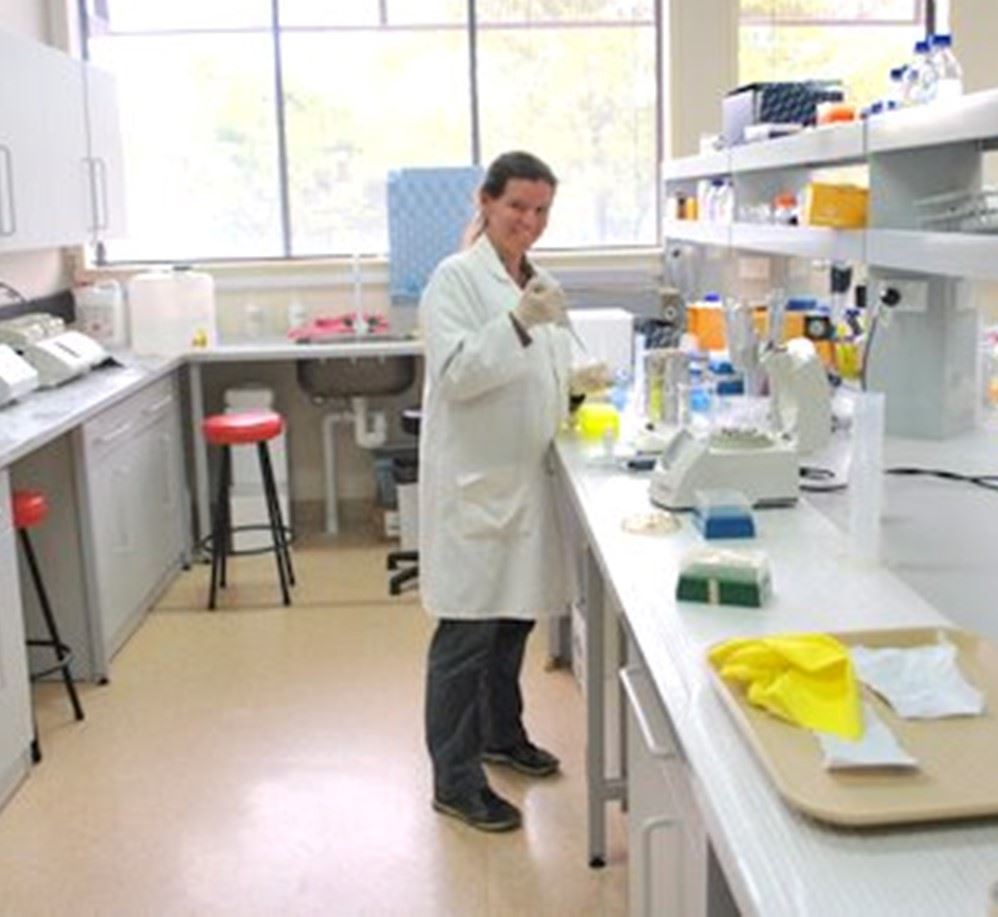 The 2010 recipient was Alison Hewitt, a PhD student at the University of Western Sydney. She was one of five applicants, and her topic was ‘Clonality and population structure of Melaleuca deanei’. The species is listed as vulnerable and one of the two significant populations is in the Group area. The project was a discrete part of a broader study of Melaleuca spp. leading to outcomes for the conservation of M deanei’.
The 2010 recipient was Alison Hewitt, a PhD student at the University of Western Sydney. She was one of five applicants, and her topic was ‘Clonality and population structure of Melaleuca deanei’. The species is listed as vulnerable and one of the two significant populations is in the Group area. The project was a discrete part of a broader study of Melaleuca spp. leading to outcomes for the conservation of M deanei’. 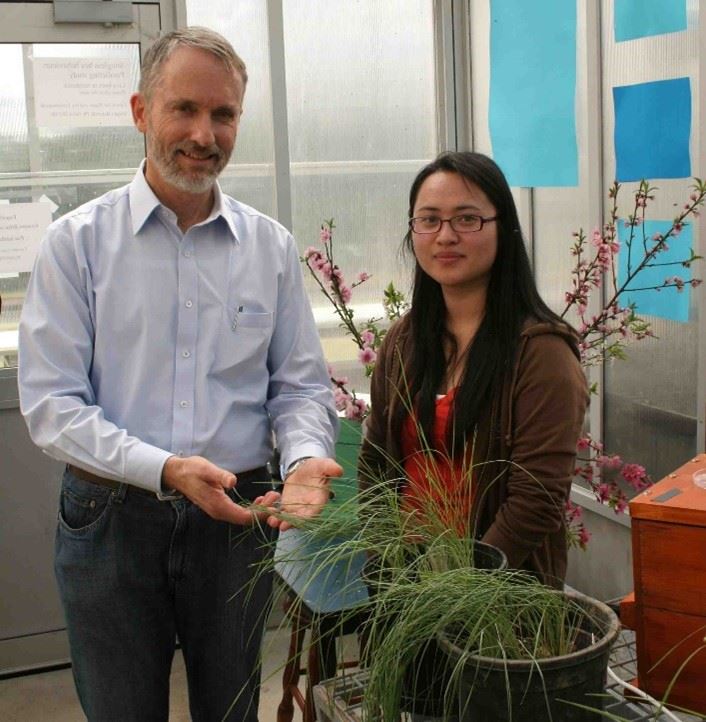 The inaugural award of the scholarship, in memory of Val Williams, was won by Liza Xian, a BSc Honours student at the University of Western Sydney.
The inaugural award of the scholarship, in memory of Val Williams, was won by Liza Xian, a BSc Honours student at the University of Western Sydney.